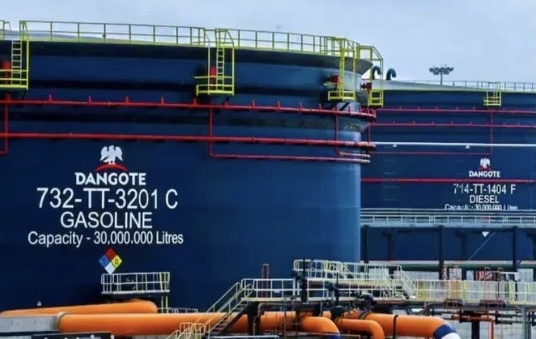KEY POINTS
- Dangote Refinery now produces 45 million litres of petrol and 25 million litres of diesel daily, exceeding Nigeria’s domestic demand.
- The refinery’s achievement strengthens the naira and advances Nigeria’s goal of energy self-sufficiency.
- Aliko Dangote promises stable fuel prices through the year-end as exports to other African markets loom.
The Dangote Petroleum Refinery has reached a historic milestone, producing a combined 70 million litres of petrol and diesel daily, a volume that outstrips Nigeria’s total domestic fuel demand.
The achievement, revealed by the Group’s Chief Branding and Communications Officer, Anthony Chiejina, marks a turning point in Nigeria’s long-standing struggle with fuel scarcity and foreign dependency.
According to Chiejina, the refinery currently produces 45 million litres of petrol and 25 million litres of diesel each day, a feat that not only secures local supply but also reinforces the value of the naira by reducing the need for foreign exchange to import refined products.
“Our operations are driven by a clear mission to protect national energy security, stabilise the naira, and end Africa’s dependence on imported fuel,” he said.
He added that domestic refining plays a pivotal role in cutting foreign exchange losses, while boosting industrial development and job creation. The plant, one of the largest in the world, has become a cornerstone in Nigeria’s pursuit of economic stability and energy independence.
Africa’s energy landscape set for change
The Dangote Refinery is not merely meeting Nigeria’s energy needs; it is reshaping the continent’s refining landscape. With cutting-edge technology and a capacity that exceeds national requirements, the company plans to export refined products to neighbouring African countries, a move analysts say could gradually end the continent’s reliance on imported fuel.
At present, many African nations still depend heavily on European and Asian refineries for petrol and diesel. Dangote’s increasing output offers an alternative supply route from within Africa, positioning Nigeria as a potential energy hub.
The development also holds promise for regional trade integration and stronger foreign reserves for the country.
Aliko Dangote, President of Dangote Industries Limited, assured that fuel prices will remain stable through the end of the year, emphasising his commitment to consistent supply and fair pricing. “Our priority is to ensure that Nigerians have steady access to fuel at affordable rates,” he said.
Energy analysts believe that if the refinery maintains this level of production, it could transform Africa’s energy ecosystem, potentially making Nigeria a net exporter of refined products for the first time in decades.
Beyond national pride, the milestone signals a broader shift towards African self-reliance in an industry long dominated by imports and external influence.



